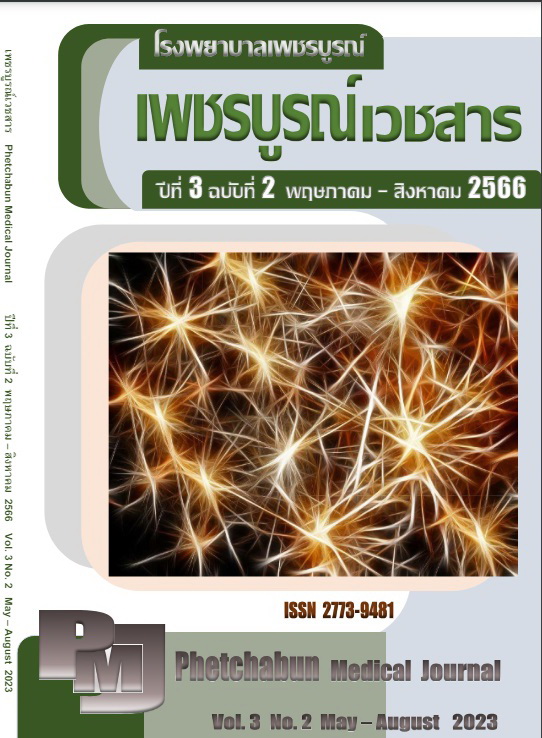The effects of proactive home visiting model for stroke patients in the COVID-19 era at Maesot Municipality
Keywords:
Home visit, stroke, expanded chronic care model (ECCM),, COVID-19Abstract
The objective of this action research was to develop a proactive home visiting model for long-term care of stroke patients at Mae Sot Municipality under the situation of the COVID-19 outbreak. The Expanded Chronic Care Model (ECCM) was used incorporate with participation of communities and health service units. The research was divided into 4 phases including: 1) Phase 1 studied problems in caring for stroke patients in the COVID-19 outbreak situation. 2) Phase 2 developed a proactive home visiting model for caring stroke patients. 3) Phase 3 operated according to the care model for stroke patients and 4) Phase 4 evaluated the care model for stroke patients. The study area was 20 communities in Mae Sot Municipality, Tak province. The sample consisted of 62 key informants, consisting of 1) a group of long-term stroke patients, 2) family caregivers’ group, community leaders’ group, and 4) health care provider group. The tools used to collect data include interviews with key informants, both quantitative and qualitative. Data collection was carried out from September 2021 to March 2022. Quantitative data was analyzed using statistics including frequency, percentage, mean, standard deviation, and paired t-test. Qualitative data was analyzed with content analysis method. Results were summarized as follows:
1. Problems with long-term care for stroke patients in Mae Sot Municipality under the situation of the COVID-19 outbreak, in the view of key informants were including relatives care lack of knowledge and skills for patients care, not confident and lack of how to take care. The environment within the patient's home was not conducive to physical rehabilitation. The community leaders lack of policy for patient care clearly and continuity. Community leaders lack awareness and understanding of stroke patient needs. Local and service unit levels lack of action plans or guidelines for patient care and discontinuity, and also data recording of stroke patient in the Thai COC program was inconsistent and uncurrent.
2. Developing a proactive home visiting model for stroke patients caring in the COVID-19 outbreak situation, in the perspective of key informants found that patients, relative caregivers, community leaders, and community members gained knowledge and skills regarding stroke. Relative caregivers and village health volunteers gained more confidence in patients care, and cooperation for policies promotion and action plans for long-term care in stroke patients, and also encourage the appointment of a subcommittee to support the provision of long-term care services for the elderly and other persons with dependency to carry out the long-term public health care project for the elderly effectively.
3. Outcomes of care for patients with stroke, after developing the care model for stroke patients found that 1) stroke patients had a score of 11.8% in their ability to perform daily activities and all patients had no complications. Fifty-two-point nine percent of patients received 1 or more doses of the COVID vaccine. 2) After the development of the model, caregivers had average scores for overall satisfaction with public health promotion regarding stroke increased higher than before the model was developed statistically significant (Mean =4.21, 3.66, p=0.001).
In summary, the proactive home visiting model resulted in patients' encouragement and efforts to reduce their
dependency on relatives caring. Patients received continuous care that met their problems and did not develop
complications. Village health volunteers and relatives have confidence in caring for patients. There is cooperation between the
community and leaders that promote policies and action plans for patient care and the community receives maximum benefit.

Downloads
Published
How to Cite
Issue
Section
License

This work is licensed under a Creative Commons Attribution-NonCommercial-NoDerivatives 4.0 International License.


